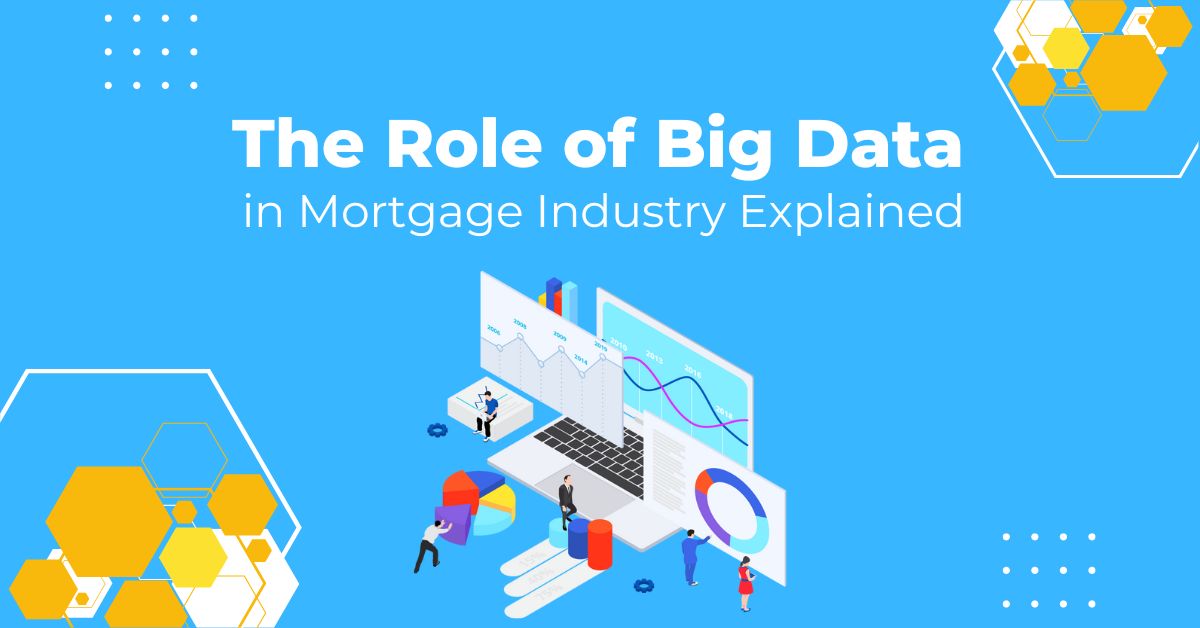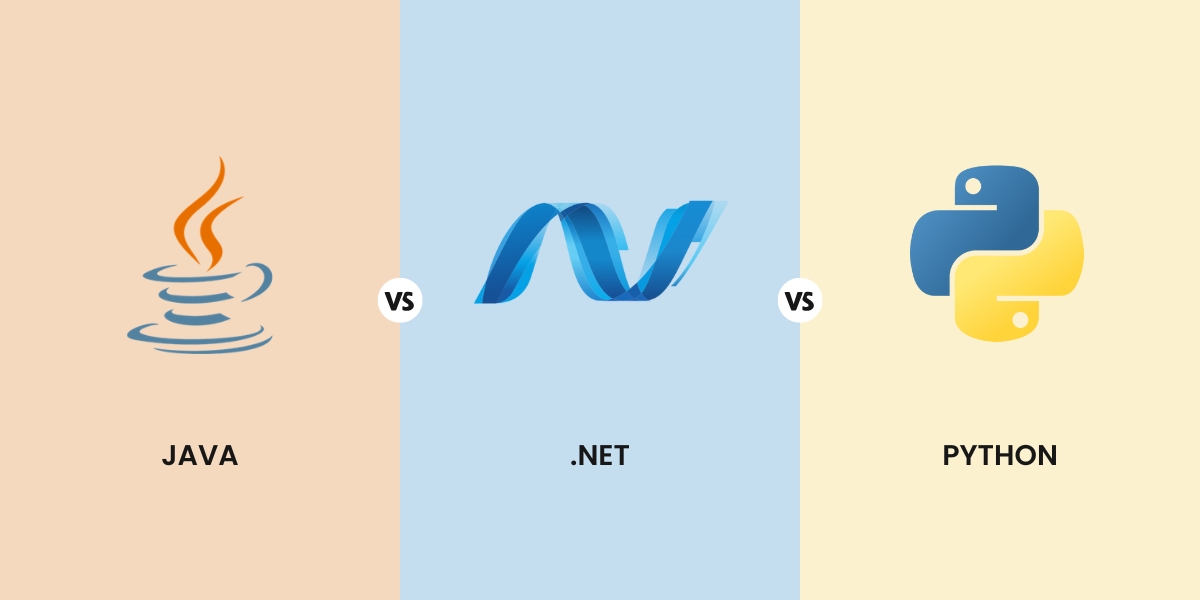The Role of Big Data in Mortgage Industry Explained

4 min read | By Postpublisher P | 15 March 2023 | Technology
The term “Big Data” is considered mainstream today. But if you are not exactly sure what it means, we’ll explain it to you before we get specific into the role of big data in mortgage industry.
What is Big Data?
Big Data is generally used to describe large amounts of information that are collected from different sources like social media, websites, search engines, and other similar mediums.
According to stats, there are 2.5 quintillion bytes of data created each day. With innovations like Machine learning, IoT, and other emerging technologies the data is bound to increase greatly.
With so much data, it’s hard for traditional methods to store and make sense of it. That’s where Big Data comes into play. It provides new tools and improved techniques for analyzing all the data and finding information.
Big data techniques are used to analyze and reveal patterns that can be used to make more informed decisions that might not be visible otherwise. Businesses use Big data to better understand their customers and improve their products or services.
Government bodies use it to track things like traffic patterns or disease outbreaks. Researchers can use it to make new discoveries in fields like medicine or climate science. All such innovations are made possible with Big data.
What makes it Big Data?
Not all data is considered Big Data. Only the datasets that are so diverse and complex to manage and the process is called Big Data, which have five common characteristics. These characteristics are also called as 5 V’s of Big Data, which are: Volume – the size of data; Variety – diversity of data; Value – effectiveness of data; Velocity – speed of data; Veracity – accuracy of data.
Role of Big Data in Mortgage Industry
The mortgage industry involves data that fits the above said characteristics. The different types of data include credit reports, employment data, property data, loan performance data, market trends, and more. By analyzing all of this data, lenders can gain a complete picture of a borrower’s financial history, creditworthiness, and risk level.
With the help of big data, lenders can identify borrowers who are at a higher risk of default or predict which markets are likely to experience price fluctuations in the future, allowing them to improve decision-making, reduce risk and provide better service to customers.
Here are a few brief points on the impact of big data in mortgage industry:
𝐈𝐦𝐩𝐫𝐨𝐯𝐞𝐝 𝐔𝐧𝐝𝐞𝐫𝐰𝐫𝐢𝐭𝐢𝐧𝐠: Lenders can gain a complete understanding of a borrower’s financial history and creditworthiness. This can be helpful in making decisions on loan approval, interest rate, credit scores, etc.
𝐁𝐞𝐭𝐭𝐞𝐫 𝐑𝐢𝐬𝐤 𝐌𝐚𝐧𝐚𝐠𝐞𝐦𝐞𝐧𝐭: By analyzing loan performance data and market trends, lenders can identify potential risks and take steps to reduce them.
𝐄𝐧𝐡𝐚𝐧𝐜𝐞𝐝 𝐂𝐮𝐬𝐭𝐨𝐦𝐞𝐫 𝐄𝐱𝐩𝐞𝐫𝐢𝐞𝐧𝐜𝐞: When data like social media activity or website behavior is analyzed, lenders can get much unique information to understand customer needs that can be used to personalize the customer experience and communication.
𝐈𝐦𝐩𝐫𝐨𝐯𝐞𝐝 𝐄𝐟𝐟𝐢𝐜𝐢𝐞𝐧𝐜𝐲: By automating certain aspects of the lending process, Big Data can help lenders operate more efficiently. For example, by using algorithms to analyze loan applications, lenders can reduce the time and resources required to process applications and make lending decisions.
𝐑𝐞𝐚𝐥-𝐓𝐢𝐦𝐞 𝐌𝐚𝐫𝐤𝐞𝐭 𝐀𝐧𝐚𝐥𝐲𝐬𝐢𝐬: Traditionally, industry reports and expert analysis were the only limited source to predict market analysis. But with Big Data, real-time data from online sources, news feeds, and social media can be analyzed to stay up-to-date on market trends.
𝐅𝐫𝐚𝐮𝐝 𝐃𝐞𝐭𝐞𝐜𝐭𝐢𝐨𝐧: Big Data is used to analyzing data such as income, employment history, credit history, etc. With this information now lenders can identify patterns and discrepancies that may indicate fraudulent activity. This can protect lenders against losses by avoiding loans to fraudulent borrowers.
𝐏𝐫𝐞𝐝𝐢𝐜𝐭𝐢𝐯𝐞 𝐀𝐧𝐚𝐥𝐲𝐭𝐢𝐜𝐬: Historical data on loan performance, market trends, and borrower characteristics is analyzed using Big data that can help lenders make predictions about future performance to prepare better management strategies.
Limitations of Big Data in Mortgage Industry
Even though big data in the mortgage industry is opening new potential, it has its own set of limitations that needs to be improved. As a professional in the mortgage industry, it is important to know these limitations mentioned below while working with Big data.
𝐏𝐨𝐨𝐫 𝐃𝐚𝐭𝐚 𝐐𝐮𝐚𝐥𝐢𝐭𝐲: Big Data relies on large volumes of data from a variety of sources. The major challenge in the mortgage industry is to ensure the data is of high quality and it is accurate. Poor data quality results in improper insights and leads to unprecedented loss.
𝐋𝐚𝐜𝐤 𝐨𝐟 𝐃𝐚𝐭𝐚 𝐏𝐫𝐢𝐯𝐚𝐜𝐲 𝐚𝐧𝐝 𝐒𝐞𝐜𝐮𝐫𝐢𝐭𝐲: If you are using Big data, it is your responsibility that you are not violating the privacy and security of the customers by sharing sensitive or confidential information. This is quite a serious issue as mortgage industries are liable to face multiple lawsuits for using personal data in ways that violate data privacy regulations.
𝐑𝐞𝐪𝐮𝐢𝐫𝐞𝐝 𝐒𝐤𝐢𝐥𝐥 𝐒𝐞𝐭: With the high volume of different data types, mortgage industry professionals require the help of skilled data analysts to interpret information effectively. You can either invest in training and development for an in-house expert or outsource to a big data service provider to get custom solutions for your business.
𝐇𝐢𝐠𝐡 𝐂𝐨𝐬𝐭: Building the infrastructure needed to store and process large amounts of data is expensive. The cost of hiring skilled data analysts also adds to the overall cost.
𝐑𝐨𝐨𝐦 𝐟𝐨𝐫 𝐁𝐢𝐚𝐬: Big Data is subjected to bias at a different portion of the data pipeline. Though intentional biases are required to segregate potential audiences, unintentional bias influenced by historical patterns like discrimination can unfairly deny access to credit or charge higher interest rates to certain individuals.
Final Words on Big Data in Mortgage Industry
With the continuous use of big data and advancements to reduce limitations, the future of the mortgage industry looks promising. Implementing big data in the mortgage industry can improve efficiency, reduce risk, and create a more personalized and transparent lending experience for borrowers.
We hope this blog has helped you understand the role of big data in mortgage industry. To know more about how big data can help your business, reach out to our experts for a free consultation and get customized solutions.
Leave a Reply
The latest from our editors
Join over 150,000+ subscribers who get our best digital insights, strategies and tips delivered straight to their inbox.



One reply on “The Role of Big Data in Mortgage Industry Explained”
Hi there! Your website’s content is truly impressive. Your blogs are a goldmine of information, and I’m excited to dive deeper into this subject through your posts. Your approach to tackling this topic is admirable. Keep shining and inspiring others! I really appreciate this blog about mortgage .